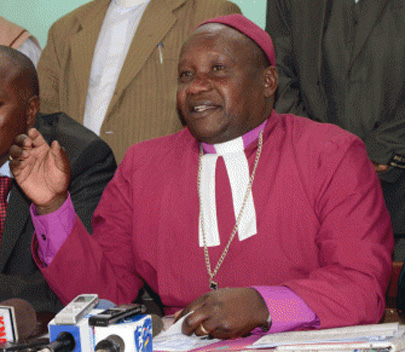Don’t cry over Anglicans who lost the power to oppress
Colin Stewart is a 45-year journalism veteran living in Southern…

The Anglican Communion worries too much about the feelings of its traditional members who reject marriage equality and too little about mistreatment of LGBTI Christians, says journalist Jim Naughton, who specializes in coverage of the United States-based Episcopal Church.
The occasion for his commentary was the April 8-19 meeting in Zambia of various Anglican Communion member churches — all of them originally descended from the Church of England — that includes representatives of the gay-friendly Episcopal Church as well as many representatives of more traditional (and some quite homophobic) Anglican churches. These are excerpts from his commentary:
Even Our Compassion Has Been Colonized

… This morning [April 11], Bishop Josiah Fearon, secretary general of the Anglican Communion, gave this address to the 16th meeting of the Anglican Consultative Council now gathered in Lusaka, Zambia. Among the first topics he addressed was the provisions the Episcopal Church is making for leaders who do not agree with the broader church’s decision to celebrate same-sex marriages. Bishop Fearon meant to praise us, it seems, and to demonstrate to the wider communion that Episcopalians are capable of working together despite deep theological differences. But his speech revealed how deeply suspicious the communion remains of lesbian, gay, bisexual and transgender Anglicans, and how eager it is to treat as victims those who have lost nothing more than the capacity they once had to oppress.
For more than a decade, the Anglican Communion has labored to placate the consciences of theologically conservative North American bishops, men who make a comfortable living on their way to generous pensions. …
Compare this treatment to that of Anglicans in other provinces whose liberty and livelihoods are in daily jeopardy because they are lesbian, gay, bisexual or transgender, or are supportive of LGBT people. You won’t find a word about LGBT Anglicans who live at risk and whose churches will not help them in Bishop Fearon’s speech—indeed, he dismissed young African Anglican protestors who assembled outside Canterbury Cathedral in January as mere children who had lived too long away from home to be taken seriously. So permit me a paragraph to tell you about the ones I know.

I have an Anglican friend in Kenya who aspires to study for the priesthood. She sent me photographs on Facebook recently of the jail cell in which she was being held overnight for the crime of sitting at a table in a bar with other women. It was her second arrest for the same offense.
I have another Anglican friend in an African country I won’t name who can’t find work, despite being a brilliant teacher and writer, because he advocates greater tolerance for LGBT people whom his government disdains. He and his family live perpetually on the edge of economic disaster.
And I have a third friend, a priest in yet another African country, who had his stipend cut for speaking on behalf of LGBT people and was thus not able to afford his children’s school fees and could not buy fertilizer for the garden plot on which he and his family were partially dependent for food.
When I think about people who most need the spiritual and material support a worldwide body of Christians such as the Anglican Communion can offer, when I meditate on people who need protection, who need to be reassured that they are not alone, I don’t immediately focus on highly educated, economically secure men with significant ecclesiastical power. Yet the communion continues to lavish attention on this group, …
When we speak of LGBT issues in the Anglican context, there are two kinds of people: Those who are in danger for losing their lives, liberties and livelihoods, and those who are not. And I vacillate between rage and despair over the fact that this latter group remains at the center of our conversation, while the former remains on the margins.
Somehow, the Anglican Communion has argued itself to a place in which theologically conservative westerners are perched at the top of the list of people whose needs must be met, while those who suffer real consequences for attempting to live out their beliefs can be safely belittled or ignored. We have taken the values of the gospel and stood them on their heads.
For more information, read the full commentary, “Even Our Compassion Has Been Colonized,” in House of Deputies News.
Related articles:
- Dissent weakens anti-gay coalition in Anglican Communion (April 8, 2016, 76crimes.com)
- Episcopal Church is in — not out — at Anglican gathering (March 2016, 76crimes.com)
- Plea to Ugandan archbishop: Love your LGBT neighbor (Feb. 29, 2016, 76crimes.com)
- Archbishop of Canterbury to LGBTI community: Sorry! (Jan. 15, 2016, 76crimes.com)
- African Anglicans: English protest vs. Ugandan rallies (Jan. 19, 2016, 76crimes.com)
- Justin Welby says sorry to LGBTI community for hurt and pain caused by Anglican church (Jan. 15, 2016, The Guardian)
- Canterbury rally to Anglican leaders: Listen to LGBTI people (Jan. 14, 2016, 76crimes.com)
- Anglicans discipline Episcopalians over same-sex marriage (Jan. 14, 2016, 76crimes.com)
- Stonewall CEO: A split in the Anglican Church could be dangerous for LGBT people – religious or not (Jan. 12, 2016, The Telegraph)
- Barbaric’ Anglican schism would not threaten LGBTI progress (Jan. 10, 2016, 76crimes.com)
- Anglicans’ LGBTI schism: Archbishop’s realism or bad idea? (September 2015, 76crimes.com)
- Church of England to blame for anti-gay Nigeria, Uganda? (September 2015, 76crimes.com)
- Petition to archbishops: End anti-gay purge in Kenya (September 2015, 76crimes.com)
- U.S. church plans support for LGBT-friendly Africans (June 2015, 76crimes.com)
- Anti-gay Anglicans blast archbishop for friendly chats in U.S. (January 2015, 76crimes.com)
- Eject anti-gay Anglicans or keep a poisoner at dinner? (March 2014, 76crimes.com)


